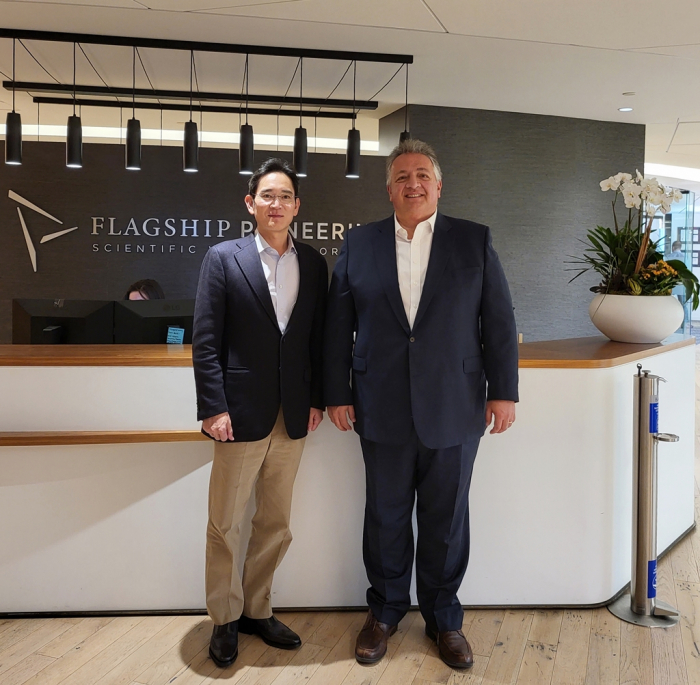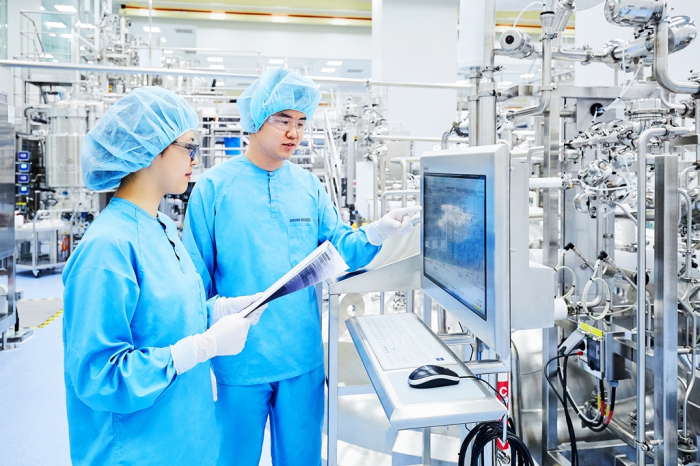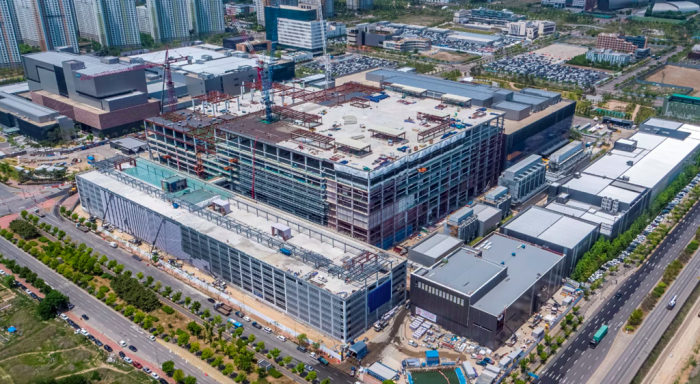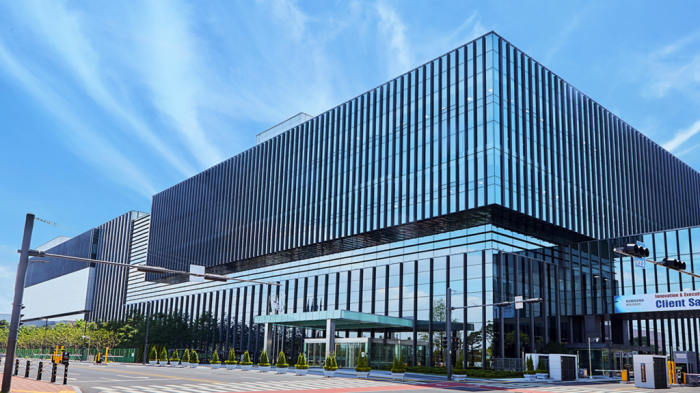Bio & Pharma
Samsung to nurture biotech as next growth engine after chips: Lee
Led by Samsung Biologics, the top Korean conglomerate hopes to repeat the success of its chip business in the biotech sector
By May 08, 2023 (Gmt+09:00)
3
Min read
Most Read
LG Chem to sell water filter business to Glenwood PE for $692 million


KT&G eyes overseas M&A after rejecting activist fund's offer


Kyobo Life poised to buy Japan’s SBI Group-owned savings bank


StockX in merger talks with Naver’s online reseller Kream


Meritz backs half of ex-manager’s $210 mn hedge fund



Samsung Group leader Lee Jae-yong, currently in the US, has vowed to make biotechnology the conglomerate’s second core strategic business after semiconductors.
After meeting with heads of global pharmaceutical firms, the chairman of Samsung Electronics Co., the world’s largest memory chip and smartphone maker, said Samsung, a latecomer to the biotech sector, will soon become a leader, particularly in the contract drug-making segment.
“The starting point is not important. With our bold and strong determination to meet challenges, we can make our biotech business another success story just as we did with semiconductors,” Lee said last week at a meeting with employees of Samsung Biologics Co.’s North American sales corporation.
“Let’s carry our success DNA with chips to the biotech realm.”
EXTENDED STAY IN US
The chairman, widely known in international business circles as Jay Y. Lee, is traveling in the US after joining the economic delegation of South Korean President Yoon Suk Yeol’s first state visit to Washington, D.C., in late April.

During his extended US stay, Lee has been meeting with executives of Samsung’s clients, which include electronics, technology and biopharmaceutical firms, Samsung officials said.
He has met with Joaquin Duato, chief executive of Johnson & Johnson (J&J); Giovanni Caforio, CEO of Bristol Myers Squibb (BMS); Chris Viehbacher, CEO of Biogen Inc.; Kevin Ali, CEO of Organon & Co.; and Noubar Afeyan, Moderna Inc.'s co-founder and the CEO of Flagship Pioneereing, a biotech venture capital firm.
In meetings with biotech executives, Lee explored new business opportunities and sought to expand collaboration with them, Samsung officials said.
BMS is one of Samsung’s early clients. It placed drug consignment orders with Samsung Biologics in 2013, when it began manufacturing drugs under contract.
Samsung Biologics has manufactured Moderna’s messenger ribonucleic acid (mRNA)-based COVID-19 vaccine at its Korean plants.
Lee’s latest meeting with Moderna co-founder Afeyan comes less than two years after their previous meeting in November 2021.

AIMS TO REPEAT THE SUCCESS OF CHIPS
Samsung Biologics has been ramping up its facilities to meet growing client demand.
Most biopharmaceutical companies such as Pfizer, Moderna, AstraZeneca, and Janssen — Johnson & Johnson’s pharmaceuticals division — focus on R&D. Lacking manufacturing facilities, they outsource production to contract drugmakers.
Korea is home to the world’s leading contract drug manufacturers.
Samsung Biologics, the biotech unit of Korea’s top business group, has focused on manufacturing drugs for others in a scheme known as a contract manufacturing organization (CMO) since entering the biopharmaceuticals market in 2011.
The company now aims to solidify its leadership in the contract development and manufacturing organization (CDMO) segment, which involves cooperation from the drug development stage, which is more profitable.

In 2012, Samsung Group created another biopharmaceutical unit, Samsung Bioepis Co., which develops and produces biosimilar drugs for other companies.
Samsung Biologics, which last October opened its fourth CDMO factory — the world’s largest on a single site — said in March it will spend 1.98 trillion won ($1.5 billion) to build a fifth plant in Songdo, Incheon, west of Seoul.
Upon the launch of the fifth plant, Samsung’s drug manufacturing capacity will reach 784,000 liters, further widening its lead over rival contract drugmakers, Samsung officials said.
Last July, Samsung Biologics said it would double its manufacturing capacity by building four more plants costing 7 trillion won to become the world’s leader in both the CMO and CDO businesses.
The company posted 980 billion won in operating profit on 3 trillion won in sales in 2022.
The global CDMO market is steadily increasing, despite heightened competition. In particular, Samsung Biologics' focus of antibody drug manufacturing is seeing growing demand.
Samsung Biologics serves more than half the world’s top 10 drugmakers as their contract drugmaker.
Write to Ye-Rin Choi at rambutan@hankyung.com
In-Soo Nam edited this article.
More to Read
-
 Business & PoliticsSamsung’s Lee likely to meet Apple, Google, MS CEOs during US trip
Business & PoliticsSamsung’s Lee likely to meet Apple, Google, MS CEOs during US tripApr 20, 2023 (Gmt+09:00)
3 Min read -
 Bio & PharmaSamsung Biologics to invest $762 mn for 5th CDMO factory
Bio & PharmaSamsung Biologics to invest $762 mn for 5th CDMO factoryMar 16, 2023 (Gmt+09:00)
2 Min read -
 Bio & PharmaSamsung Biologics bags $183 million CMO order from Pfizer
Bio & PharmaSamsung Biologics bags $183 million CMO order from PfizerMar 02, 2023 (Gmt+09:00)
2 Min read -
 Bio & PharmaSamsung Biologics in CDO deal talks with global pharma firm
Bio & PharmaSamsung Biologics in CDO deal talks with global pharma firmNov 07, 2022 (Gmt+09:00)
2 Min read -
 Bio & PharmaSamsung Biologics opens the world's largest CDMO factory
Bio & PharmaSamsung Biologics opens the world's largest CDMO factoryOct 11, 2022 (Gmt+09:00)
1 Min read -
 Bio & PharmaSamsung Biologics to double CDMO capacity with new plants worth $5.3 bn
Bio & PharmaSamsung Biologics to double CDMO capacity with new plants worth $5.3 bnJul 18, 2022 (Gmt+09:00)
2 Min read
Comment 0
LOG IN


